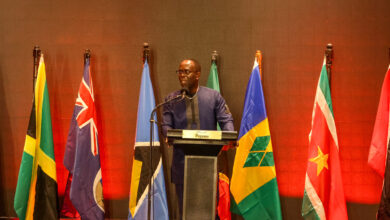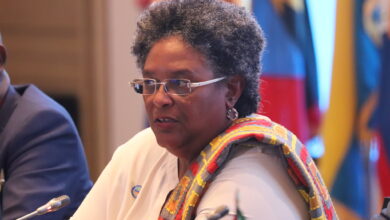It is my great pleasure to represent the Caribbean Community Secretariat and to bring you greetings on behalf of the Secretary-General, H.E. Mr Edwin Carrington and indeed the entire Caribbean Community.
When the Caribbean Accreditation Authority for Education in Medicine and other Health Professions was inaugurated on July 14, 2004 in Kingston, Jamaica, it marked a watershed in a process that engaged the entire Caribbean Community and medical professionals in particular in finding a formula to achieve an internationally recognized accreditation mechanism. This process involved in-depth research, collaboration with international expertise in this area and the political will of our education and health officials – in particular Ministers of Government, the Region’s universities and CARICOM Heads of Government.
Today, almost three years after its inauguration, this authority, in partnership with the World Federation for Medical Education, has brought together leading regional and international experts to reflect on the process and to examine efficient and effective options for perfecting the accreditation system.
This Conference is being held at a time when the Caribbean Region is engaged in one of its most challenging enterprises, that of establishing a CARICOM Single Market and Single Economy. This enterprise is anchored in the revised Treaty of Chaguaramas and manifests the unfolding of regulations and activities designed to achieve free movement of goods, capital and people.
Each of these elements is guided by rules, procedures and common standards that would lead to orderly and transparent policies that would in turn promote a viable regional movement – a movement capable of competing with others in the global arena. In this regard, this Conference will benefit from learning of the experiences in multilateral systems of which the European Community is the only other regional integration system from which lessons may be learned.
When our regional education and health professionals advocated for a Caribbean accreditation mechanism, it was in full recognition of the need for our medical and other health professionals to be capable of functioning effectively within the global arena where competition for skills continuously contend. It was also in full recognition that the CARICOM Community had already initiated a process for an umbrella accreditation mechanism that would involve all professions networking with national accreditation authorities.
This wider umbrella mechanism has been evolving. In the meantime, Heads of Government agreed that preserving the status of our medical and other health professions was so critical that an accreditation mechanism to specifically cater to these professions was actually accelerated from concept to reality. Indeed, CAAM jumped the regional cue. It just could not await the gradually unfolding umbrella regional system. So here we are today discussing the role and future of the Caribbean Accreditation Authority for Education in Medicine and other health professions.
Accreditation issues cannot however be discussed in a vacuum. In the Community, as is the case for most of the developing world, several pertinent issues must be addressed simultaneously with streamlining and perfecting the accreditation mechanism. Perhaps most important of which is how to contain the out migration of our medical doctors and particularly our nurses. A CARICOM background paper prepared for the UN High-Level Dialogue on Migration and Development, 14-15 September 2006, showed that over the past 10 years approximately 50,000 nurses migrated at an estimated loss of US$2.2M from the investment in training at the public’s expense.
The Report of the Caribbean Commission on Health and Development chaired by Sir George Alleyne directly associated the shortage of nurses in the CARICOM Region to the shortage of trained personnel. It is also directly linked to the current rate of vacant nursing positions estimated at 12 percent of the total workforce, and the decline in graduating nurses by 23 percent. Indeed, the shortfall in nurses predicted by the US Department of Health and Human Services (2002) will be 800,000 by 2020.
Similar studies for medical doctors, medical technicians, teachers and other trained personnel reveal startling statistics, especially for countries like Jamaica and Guyana where an IMF study (2005) estimates that over 40 and 75 percent respectively of trained personnel in these countries migrated from 2000-2004. As a result, at the Twenty-Seventh Meeting of the Conference of Heads of Government held in July 2006, it was agreed that special attention be paid to establishing policies in specific areas such as:
i. the development of migration policy;
ii. the verification of strategies for the retention of skilled labour;
iii. establishment of a reliable information system/database;
iv. use of information to enhance national capacity; and
v. building social support systems to respond to the requirements of voluntary and involuntary return migrants.
With special reference to medical doctors and nurses, the Council for Human and Social Development has called for an overall policy of managed migration which is also a subject to be pursued at the Conference on the Caribbean scheduled for next month in Washington, which is an engagement between CARICOM and US stakeholders, including governments, the private sector, philanthropic interests and the Diaspora.
Another relevant area is the implications of the liberalization of tertiary education and its impact on the Universities of the Region, including the Faculties of Medicine and other health specializations. The issue of the liberalization of higher educational services falls directly under the World Trade Organization (WTO) General Agreement on Trade in Services and has particular implications for UWI as a regional higher education institution. Liberalization of higher education, according to a study by UWI, would result in the diversion of public funding from UWI and other national universities. In the context of the proliferation of off-shore universities, only a few CARICOM States have established appropriate legislation and administrative arrangements for regulation and ensuring quality assurance.
There is need to strike a balance between the advantages to be gained from increased direct foreign investment in the higher education sector and the need to protect the viability of the Region’s tertiary level institutions and the learning integrity of Caribbean citizens. It has therefore been agreed within CARICOM to adopt a regional position on these issues, which may require re-negotiation to safeguard the special interests of the Community.
The question that must be answered in a forum such as this one is the extent to which accreditation programmes, though essential, actually contribute to sustainability within the health sector when both internal and external pressures adversely affect the pool and quality of trained personnel.





